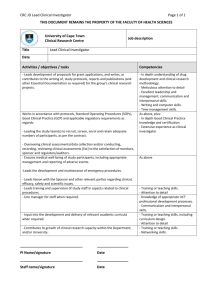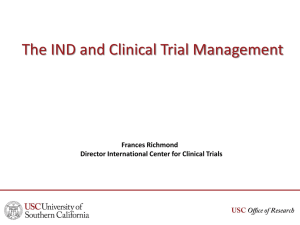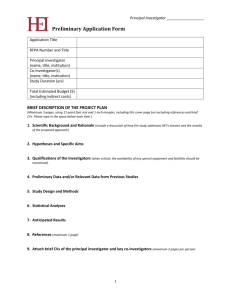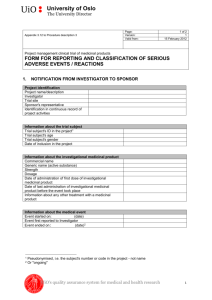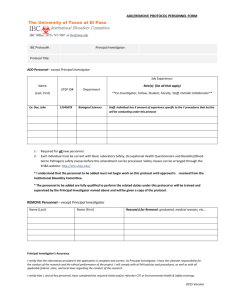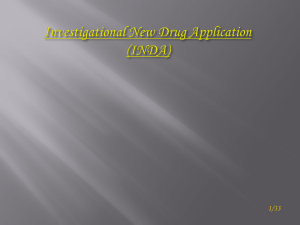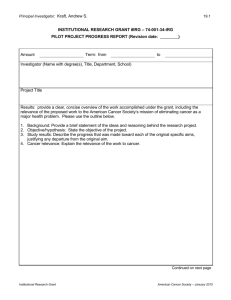Research With Investigational Test Articles
advertisement
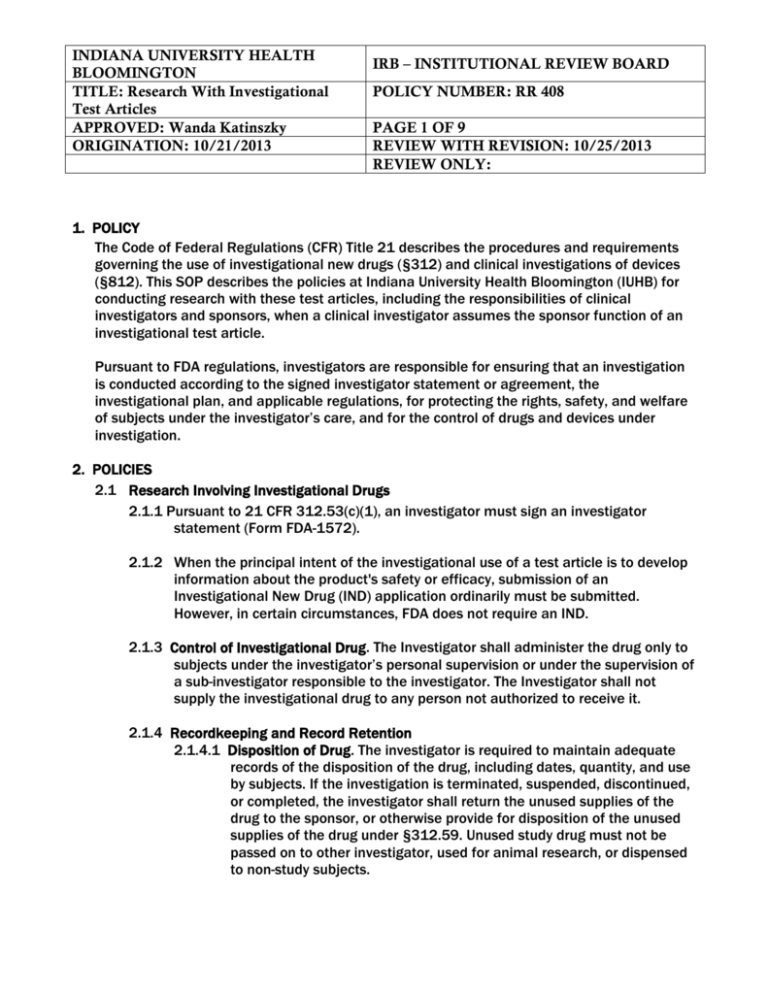
INDIANA UNIVERSITY HEALTH BLOOMINGTON TITLE: Research With Investigational Test Articles APPROVED: Wanda Katinszky ORIGINATION: 10/21/2013 IRB – INSTITUTIONAL REVIEW BOARD POLICY NUMBER: RR 408 PAGE 1 OF 9 REVIEW WITH REVISION: 10/25/2013 REVIEW ONLY: 1. POLICY The Code of Federal Regulations (CFR) Title 21 describes the procedures and requirements governing the use of investigational new drugs (§312) and clinical investigations of devices (§812). This SOP describes the policies at Indiana University Health Bloomington (IUHB) for conducting research with these test articles, including the responsibilities of clinical investigators and sponsors, when a clinical investigator assumes the sponsor function of an investigational test article. Pursuant to FDA regulations, investigators are responsible for ensuring that an investigation is conducted according to the signed investigator statement or agreement, the investigational plan, and applicable regulations, for protecting the rights, safety, and welfare of subjects under the investigator’s care, and for the control of drugs and devices under investigation. 2. POLICIES 2.1 Research Involving Investigational Drugs 2.1.1 Pursuant to 21 CFR 312.53(c)(1), an investigator must sign an investigator statement (Form FDA-1572). 2.1.2 When the principal intent of the investigational use of a test article is to develop information about the product's safety or efficacy, submission of an Investigational New Drug (IND) application ordinarily must be submitted. However, in certain circumstances, FDA does not require an IND. 2.1.3 Control of Investigational Drug. The Investigator shall administer the drug only to subjects under the investigator’s personal supervision or under the supervision of a sub-investigator responsible to the investigator. The Investigator shall not supply the investigational drug to any person not authorized to receive it. 2.1.4 Recordkeeping and Record Retention 2.1.4.1 Disposition of Drug. The investigator is required to maintain adequate records of the disposition of the drug, including dates, quantity, and use by subjects. If the investigation is terminated, suspended, discontinued, or completed, the investigator shall return the unused supplies of the drug to the sponsor, or otherwise provide for disposition of the unused supplies of the drug under §312.59. Unused study drug must not be passed on to other investigator, used for animal research, or dispensed to non-study subjects. TITLE: Research With Investigational Test Articles REVIEW WITH REVISION: 10/25/2013 POLICY NUMBER: RR 408 PAGE 2 OF 9 2.1.4.2 Case Histories. The investigator is required to prepare and maintain adequate and accurate case histories that record all observations and other data pertinent to the investigation on each individual administered the investigational drug or employed as a control in the investigation. Case histories include the case report forms and supporting data including, for example, signed and dated consent forms and medical records, including for example, progress notes of the physician, the individual’s hospital chart(s), and the nurses’ notes. The case history for each individual shall document that informed consent was obtained prior to participation in the study. 2.1.4.3 Record Retention. The investigator shall retain records required to be maintained for a period of 2 years following the date a marketing application is approved for the drug for the indication for which it is being investigated; or, if no application is to be filed or if the application is not approved for such indication, until 2 years after the investigation is discontinued and FDA is notified. 2.1.5 Investigator Reports 2.1.5.1 Progress Reports. The investigator shall furnish all reports to the sponsor of the drug who is responsible for collecting and evaluating the results obtained. 2.1.5.2 Safety Reports. The investigator shall promptly report to the sponsor any adverse effect that may reasonably be regarded as caused by, or probably caused by, the drug. If the adverse effect is alarming, the investigator shall report the adverse effect immediately. 2.1.5.3 Final Report. The investigator shall provide the sponsor with an adequate report shortly after completion of the investigator’s participation in the investigation. 2.1.5.4 Financial Disclosure Reports. The investigator shall provide the sponsor with sufficient accurate financial information to allow an applicant to submit complete and accurate certification or disclosure statements as required under 21 CFR 54. The investigator shall promptly update this information if any relevant changes occur during the course of the investigation and for 1 year following the completion of the study. 2.1.6 Inspection of Investigator’s Records and Reports. The investigator shall, upon request from any properly authorized officer or employee of FDA, at reasonable times, permit such officer or employee to have access to, and copy and verify any records or reports made by the investigator pursuant to §312.62, Investigator Recordkeeping and Record Retention. The investigator is not required to divulge subject names unless the records of particular individuals require a more detailed study of the cases, or unless there is reason to believe TITLE: Research With Investigational Test Articles REVIEW WITH REVISION: 10/25/2013 POLICY NUMBER: RR 408 PAGE 3 OF 9 that the records do not represent actual case studies, or do not represent actual results obtained. 2.1.7 Handling of Controlled Substances. If the investigational drug is subject to the Controlled Substances Act, the investigator shall take adequate precautions, including storage of the investigational drug in a securely locked, substantially constructed cabinet, or other securely locked, substantially constructed enclosure, access to which is limited, to prevent theft or diversion of the substance into illegal channels of distribution. 2.2 Sponsor-Investigator Responsibilities for Research Involving Investigational Drugs. Pursuant to §312.3(b), a Sponsor-Investigator is an individual who both initiates and conducts an investigation, and under whose immediate direction the investigational drug is administered or dispensed. When an investigator assumes the sponsor function, there are additional responsibilities. 2.2.1 Investigational New Drug Application (IND) 2.2.1.1 When the principal intent of the investigational use of a test article is to develop information about the product's safety or efficacy, submission of an Investigational New Drug (IND) application ordinarily must be submitted. However, in certain circumstances, FDA does not require an IND. 2.2.1.2 The sponsor-investigator shall submit an IND to the FDA if he/she intends to conduct a clinical investigation with an investigational new drug that is subject to §312.40. 2.2.1.3 The sponsor-investigator shall not begin a clinical investigation subject to §312.2(a) until the investigation is subject to an IND which is in effect in accordance with §312.40. 2.3 Investigational Drug Services 2.3.1 All INPATIENT studies conducted at an IUHB facility should use the services of the facility’s pharmacy department. The only exception is if the investigator, after consultation with the pharmacy, determines that he/she has adequate manpower, facilities, knowledge, and time to assume all the responsibilities the pharmacy would have provided. 2.3.2 OUTPATIENT studies are not required to, but may use the pharmacy, if they wish. Using the services of the pharmacy is strongly recommended for studies involving the use of an investigational drug: 2.3.2.1 that requires preparation in a sterile hood (All IV drugs); and 2.3.2.2 that requires admixing of any kind. TITLE: Research With Investigational Test Articles REVIEW WITH REVISION: 10/25/2013 POLICY NUMBER: RR 408 PAGE 4 OF 9 2.3.3 Receipt and Inventory of Study Drug. Upon receipt of an investigational drug, the investigator or other designated individual should document that information on the packing slip matches what was sent to the site, including the amount, lot numbers, and quantity. Any discrepancies, damage, or tampering should be reported promptly to the Sponsor. 2.3.4 Prescribing and Dispensing of Study Drug. Study drugs may only be dispensed by authorized individuals according to state and federal regulations, and hospital/facility policies. If an investigator will be dispensing an investigational drug for an outpatient study, the following should be documented in the protocol and carried out during the study: 2.3.4.1 Individuals authorized to prescribe and/or dispense the study drug. These individuals must be listed in the investigators list and FDA Form 1572, as applicable. A record of authorized individuals’ signatures and initials should be maintained at all times. 2.3.4.2 Documentation of the order or prescription, e.g. order form, script, signed by authorized individuals. Study drug should only be dispensed according to the dose, route, and frequency written in the order. 2.3.4.3 Documentation of any changes, titrations, or deviations made to dosing orders or protocol dosing, along with the signature(s) of authorized individuals. Dosing changes or deviations from the protocol should only be made to protect the subject and should be reported to the IRB according to the Unanticipated Problems and Noncompliance SOP. 2.3.4.4 Each time study drug is dispensed, documentation should be made of the amount and to whom it was dispensed, and the date and signature (or initials) of the individual dispensing the study drug. Subjects should be instructed in the proper storage, use, precautions, and potential risks of the study drug. 2.3.4.5 Subjects should be advised to return all study drug containers (used and unused) to the original study drug dispensation site, unless other means of disposition have been approved. Study personnel should record the amount, e.g. number of bottles/pills, and date of return. If a subject does not return study drug containers, study personnel should document attempts to retrieve them from the subject, including a certified letter, if necessary. 2.3.4.6 Discrepancies in amounts of study drug used and returned (actual and suspected) by the subject should be documented, along with the reason(s) for the discrepancy. Major discrepancies should be followedup on with the subject and/or pharmacy to obtain an explanation. 2.3.4.7 Authorization from the Sponsor is required for dispensing study drug in special circumstances. TITLE: Research With Investigational Test Articles REVIEW WITH REVISION: 10/25/2013 POLICY NUMBER: RR 408 PAGE 5 OF 9 2.3.4.8 If the drug is to be administered at a site that is not listed on the FDA Form 1572 and the Study Summary Statement, approval must first be obtained from the Sponsor and the IRB to do so. 2.3.5 Storage of the Study Drug. The study drug should be stored in a secure environment, e.g. locked cabinet in a locked area, with access limited to authorized research personnel. The study drug should be stored at the appropriate temperature while maintaining a temperature log, if appropriate. 2.3.6 If a subject in an OUTPATIENT study requires hospitalization and the study drug needs to be administered during the subject’s hospital stay, a physician caring for the subject should write an order allowing the subject to continue taking the study drug from his/her own supply. The order should clearly document that the subject is enrolled in a study using an investigational drug. The pharmacy should also be notified of the subject’s hospitalization, if its services are being used for the study. 2.4 Research Involving Investigational Devices 2.4.1 Pursuant to 21 CFR 812.43(c)(4), an investigator must sign an agreement, which commits him/her to certain requirements. 2.4.2 When the IRB determines that the device is a significant risk device, the investigator must confirm that the device has an investigational device exemption (IDE) issued by FDA, the device fulfills the requirements for an abbreviated IDE, or the protocol meets one of the FDA exemptions from the requirements to have an IDE. 2.4.3 Receipt and inventory of study device. This section applies to those study devices the investigator dispenses/administers to the study subject. The investigator (or designated research associate) is responsible for ensuring that: 2.4.3.1 Upon receipt (preferable within 2 working days, but definitely prior to dispensing) of the study device, inventory the shipment, ensuring that the information on the packing slip matches exactly with what has been sent to the site, including the receipt date, lot numbers, device type, batch number, code mark, and quantity. Additionally, the identification of the person who received the shipment of devices should be noted. Documentation of this shipment inventory should be maintained. 2.4.3.2 Promptly (usually within 2-3 working days) bring any discrepancies to the attention of the Sponsor/supplier of the device(s). 2.4.3.3 Retain a copy of the shipping inventory, packing slips and document inventory in the study files. TITLE: Research With Investigational Test Articles REVIEW WITH REVISION: 10/25/2013 POLICY NUMBER: RR 408 PAGE 6 OF 9 2.4.3.4 Maintain an accountability log (most Sponsors will issue/supply a device accountability log). 2.4.4 Study Device Labeling 2.4.4.1 Study devices from Sponsor companies are pre-labeled and these should not be defaced, relabeled or changed in any way without written permission of the Sponsor. It is recommended that an additional label may be placed to include the study staff contact name/number, but ONLY if the Sponsor agrees. 2.4.4.2 If the Principal Investigator is responsible for labeling, he/she should be aware of applicable FDA regulations. Examples of what may appear on a label are: name of device, model number, serial number, and manufacturer. 2.4.4.3 When a study device is designated as “Investigational” per FDA regulations, there should be a label with the following information: • Name and place of business of the manufacturer, packer, or distributor. • Quantity of contents if appropriate, and the following statement: “CAUTION-Investigational device. Limited by Federal (or United States) law to investigational use.” • The label or other labeling shall describe all relevant contraindications, hazards, side effects, interfering substances or devices, warnings, and precautions. 2.4.5 Storage of the Study Device (including devices that record data from automated instruments) 2.4.5.1 Establish and maintain access controls for essential and appropriate research personnel. 2.4.5.2 Develop procedures for verifying physical access. 2.4.5.3 Store the study device in a secure environment to include locks on doors and controlled access. 2.4.5.4 Establish equipment control both into and out of the research site. 2.4.5.5 Develop Security Incident Procedures to report any privacy breaches. 2.4.5.6 Assess any privacy risks anticipated and develop methods to avoid those risks. 2.4.5.7 Develop data backup, storage, and emergency mode procedures, if applicable. TITLE: Research With Investigational Test Articles REVIEW WITH REVISION: 10/25/2013 POLICY NUMBER: RR 408 PAGE 7 OF 9 2.4.5.8 Ensure the study device is stored at the appropriate temperature, and maintain a storage area temperature log, if appropriate. 2.4.6 Dispensing of Study Devices 2.4.6.1 The investigator shall permit an investigational device to be used only with participants under his/her personal supervision or under the supervision of a co-investigator responsible to the investigator. 2.4.6.2 The investigator shall not use or supply an investigational device to any person not authorized to receive it. 2.4.6.3 Create an access log to document each time the study device is dispensed/used, where it is dispensed/used, to whom it is dispensed/used, and the date and signature or initials of the person dispensing/using the study device, (plus any other information dictated by the study protocol). 2.4.7 Return/Destruction of Study Device (as applicable to the specific device) 2.4.7.1 At the conclusion of the study, ensure that all documentation regarding receipt, storage, dispensing, return of used containers, and accountability is complete and accurate. 2.4.7.2 An explanation of why and how many device units have been returned to the sponsor, repaired, or otherwise disposed of should be noted. When a device is disposed of, the identification of the person who doing so should also be noted. 2.4.7.3 Devices obtained from a Sponsor for the specific purpose of a research study must be returned to Sponsor. Only with the written authorization (i.e. in the protocol or other written correspondence) of the Sponsor (and in compliance with Federal regulations and Institutional policies) may the investigator discard the device on site, or retain the device. 2.4.7.4 Pursuant to 21 CFR 812.110, upon completion or termination of a clinical investigation or the investigator’s part of an investigation, or at the sponsor’s request, an investigator shall return to the sponsor any remaining supply of the device or otherwise dispose of the device as the sponsor directs. 2.4.7.4.1 Unused study devices that include individually identifiable health information must not be transferred to other investigators without IRB approval or an authorization from the study subject. 2.4.7.4.2 Unused study devices without individually identifiable health information must not be transferred to other investigators, used for animal research, or dispensed to non-study patients TITLE: Research With Investigational Test Articles REVIEW WITH REVISION: 10/25/2013 POLICY NUMBER: RR 408 PAGE 8 OF 9 unless written consent is obtained from the Sponsor/Provider of the device. 2.4.7.5 Device study records must be kept for a duration of seven years (according to federal regulations and the IUHB SOP on Data Management). 2.5 Research on FDA-approved Devices for FDA-approved Indications 2.5.1 Requires documentation of receipt, storage, dispensing and return of the device as above. 2.5.2 The FDA approved label is adequate, although including information specific to the study is recommended. 2.6 Radiologics Radiation-emitting devices have similar requirements as above. However, there may be specific requirements based on the device and the study design and thus each study should be discussed with the Radiation Safety Officer at the Institution where the study is conducted. 3. SCOPE This SOP applies to all drug and device studies that involve human subjects, which are approved by the IU Health Bloomington IRB. This includes, but is not limited to, Sponsored and Investigator initiated studies, with or without an Investigational New Drug (IND) or Investigational Device Exemption (IDE). 4. RESPONSIBILITY Principal investigators are responsible for assuring that appropriate implementation of investigational device accountability is maintained per these policies and procedures. 5. APPLICABLE REGULATIONS AND GUIDELINES 21 CFR 812 Investigational Device Exemptions http://www.access.gpo.gov/nara/cfr/waisidx_02/21cfr812_02.html 4.2 21 CFR 814 Pre-Market Approval of Medical Devices http://www.access.gpo.gov/nara/cfr/waisidx_02/21cfr814_02.html 45 CFR 164.530(c)(1) Administrative Requirements, Safeguard http://a257.g.akamaitech.net/7/257/2422/14mar20010800/edocket.access.gpo.gov/cfr _2002/octqtr/45cfr164.530.htm Center for Devices & Radiological Health (CDRH) http://www.fda.gov/cdrh/ Medical Device Reporting Alternative Summary Reporting (ASR) Program http://www.fda.gov/cdrh/osb/guidance/315.html TITLE: Research With Investigational Test Articles REVIEW WITH REVISION: 10/25/2013 POLICY NUMBER: RR 408 PAGE 9 OF 9 6. REFERENCES TO OTHER APPLICABLE SOPS This SOP affects all other SOPs. 7. Attachments - None 8. PROCESS OVERVIEW The section describes the procedures as it relates to the accountability of Investigational Drugs and Devices approved by the IU Health Bloomington IRB. 9. PROCEDURES EMPLOYED TO IMPLEMENT THIS POLICY Who Task Investigator The investigator must familiarize himself/herself to their responsibilities related to conducting research with an investigation test article: drugs or devices Tool
